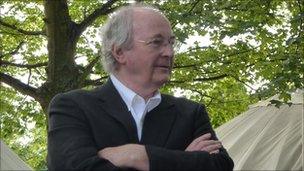Atheist author Pullman finds bishops in agreement
- Published

Philip Pullman was appearing at the Edinburgh Book festival
There was an amazing amount of agreement when Philip Pullman appeared at the Edinburgh International Book festival alongside two former bishops.
Pullman, the best-selling author of the His Dark Materials trilogy, was in Edinburgh to discuss his latest book The Good Man Jesus and the Scoundrel Christ.
The atheist author was debating themes of the book with the former Anglican Bishop of Oxford Richard Harries in a session chaired by Richard Holloway, the former bishop of Edinburgh in the Scottish Episcopal Church.
Pullman's story sets up a distinction between Jesus, a "striking individual" with a humane and moral message, and his brother Christ who betrays him.
The Good Man Jesus condemns the concept of a church, something he believes would make the devil "rub his hands with glee".
Pullman said: "I contrasted Jesus the man, as I imagined him, with Christ, the church's invention.
"Christ in the book, who is a tormented and unhappy figure, finds himself manipulated, but with a certain degree of willingness, into betraying Jesus.
"He writes stories about Jesus which he knows not to be true, because it will suit the emerging church better."
Pullman told a packed main theatre at the Charlotte Square festival that the early church could not live by Jesus's teaching so it changed them to suit its own ends.
Professor Harries lauded Pullman for writing with "moral clout" and said he had enjoyed the book.
And he agreed with Pullman about the humane qualities of Jesus.
However, he said the author had put a "great abyss between Jesus the Good man and what the church has done to him".
Prof Harries said this was not true to the New Testament.
Pullman replied that he hoped people would read the New Testament.
He said: "Far too many people who have shouted at me for one reason or another have not read the new testament."
The two former bishops pointed to a passage near the end of Pullman's novel which they enjoyed.
It has Jesus saying that the church should remain poor, powerless and modest.
Roman empire
It should wield no authority except love and should own no property and make no laws.
The church should not condemn but only forgive, the passage says.
Prof Harries said the church had been faced with making a decision in the 4th century when it became the official religion of the Roman empire.
He said: "The dilemma was should they take their fair share for ordering the world, getting their hands dirty in the very dirty world of power politics, or should they opt out all together?
"Today, we are perhaps coming to a more sane view.
"As Philip says in the book the church should not be hand in glove with power.
"The combination of church and power is the most dangerous and cruel combination in the world.
"Nevertheless, distanced from power, Christians should still seek to influence power. They should not opt-out all together."